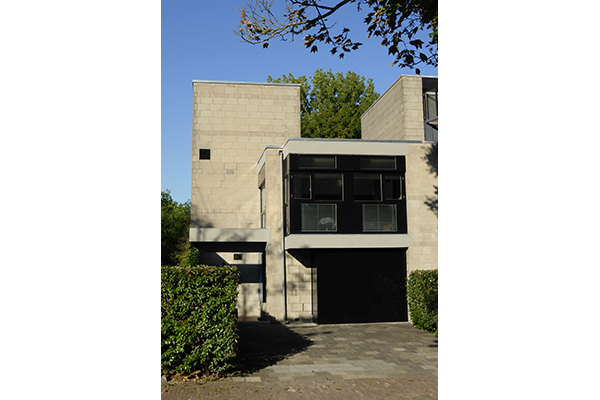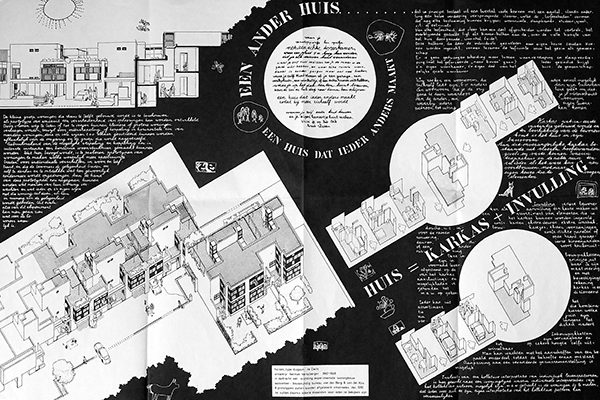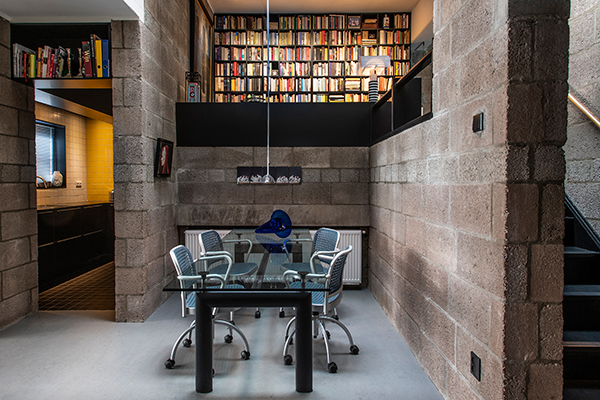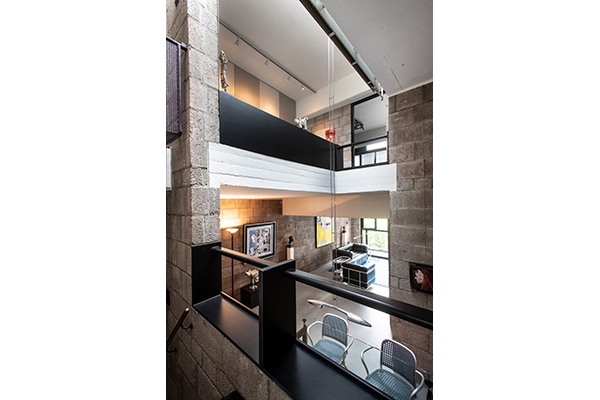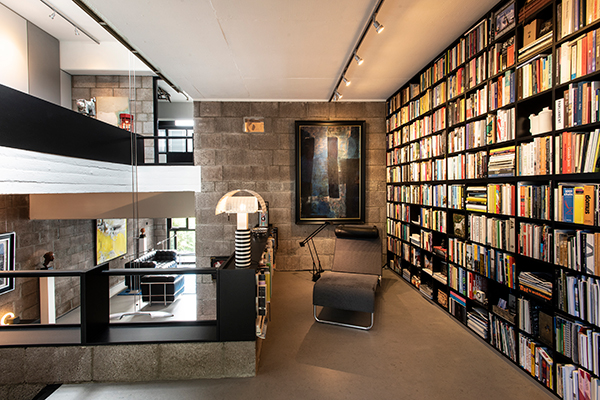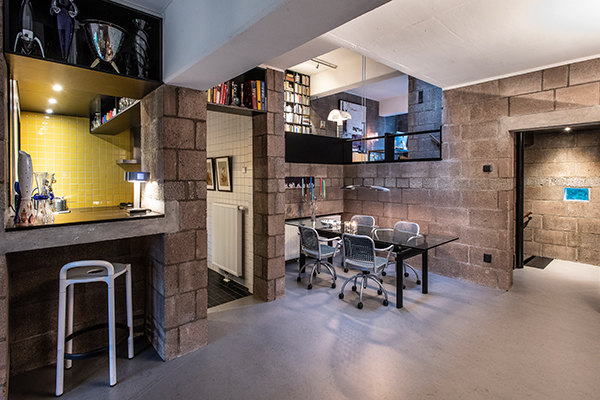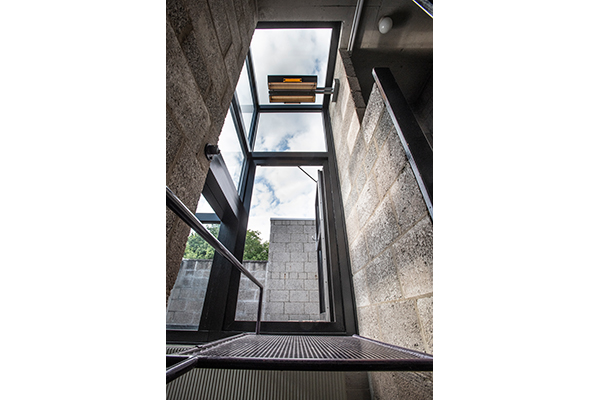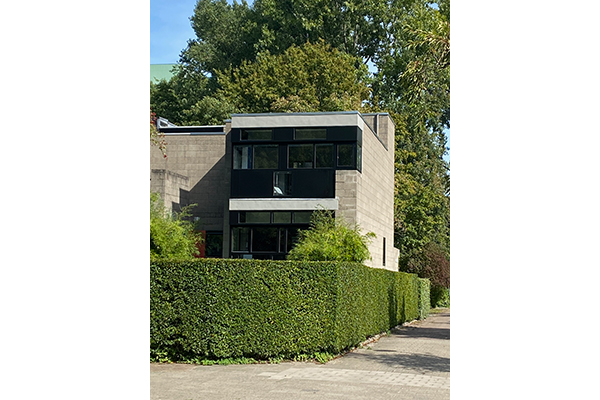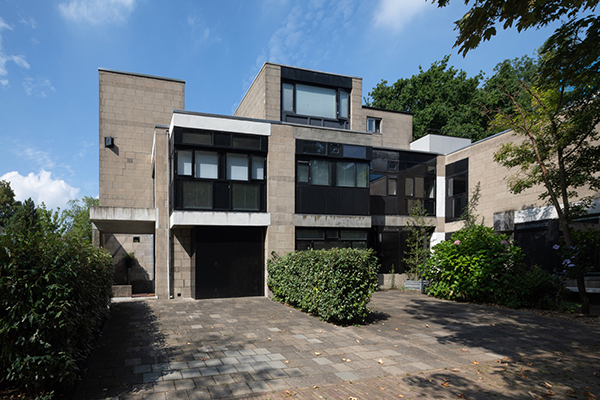What Makes a House Iconic?
Architectural Conservation Trust Launched
SPECIAL - Best of Belgium
The Humanism of Charlotte Perriand
Announcing City Icons: Barcelona & Beyond, May 29-31, 2026
SPECIAL - Casas Icónicas en España!
Inside UNESCO Icons: Houses That Made History - Part 1
Inside UNESCO Icons: Houses That Made History - Part 2
Czech It Out: A Stylish Soirée of Exhibition and Film
Sopot Hosts Icons of Czech Avantgarde Exhibition
Pioneers of the Dutch Modern House - Film Screenings
Iconic Encounters: Barcelona
SPECIAL – Austria
SPECIAL – Czech Classics
SPECIAL - Vacances en France!
SPECIAL – Iconic Dreams Europe
SPECIAL – Iconic Dreams North America
Tautes Heim. Story & Details
Casa Gomis acquired by Spain's Ministry of Culture
Our Badge of Honour
New Year's Reception and Eileen Gray Screening
Funding Win Marks Anniversary of Mackintosh Acquisition
Modernist Houses Lost in the LA Wildfires
Casa d’Abreu Neto: Siza’s First Work
Pioneers of the Dutch Modern House
Iconic Encounters: London
Interview in Leading Catalan newspaper ARA
Record Number of New Iconic Houses - Part 1
Record Number of New Iconic Houses - Part 2
At Plečnik House: To Decide Where the Shadow Falls
A Story of Burnt Books and Broken Bricks
Remembering Irving J. Gill
Iconic Houses in the Media in 2024
Bauhaus Villa in Berlin For Sale
Historical Exhibition, Marie-Laure de Noailles, Painter, Conversation
Mackintosh’s Hill House Becomes an International Iconic House!
Istanbul’s Modernist Ataköy Housing Estate is At Risk
Early Furniture Designs by Le Corbusier on Permanent Display in Maison Blanche
Photo Report City Icons Amsterdam
Healing Through Architecture
Reopening An Iconic Modernist Landmark
City Icons Kick Off with Talk by Linda Vlassenrood
MORE MIES - Pure Architecture in Haus Lange Haus Esters
Through a Bauhaus Lens: Edith Tudor-Hart and Isokon
Modernism Week Lecture: 12 Years of Iconic Houses
Aluminaire House Grand Opening
Exhibition Icons of the Czech Avant-Garde
An Elementalist and Mediterranean Architecture
Icon for Sale - Loos Villa: Haus Horner
SPECIAL – UK Originals
SPECIAL – Dutch Delights!
SPECIAL – German Greats!
SPECIAL – Northern (High)Lights!
SPECIAL – Iconic Collective Housing
SPECIAL – Women & Iconic Houses
SPECIAL – Iconic Artist Residencies
Support the Frankfurt Declaration (on Housing)
Winy Wants a World Wonder
Welcome Atelier Volten!
Sleep in a Modernist Gem – Huis Billiet in Bruges
Iconic Houses in The Netherlands - 100 Years Van Zessen House
Exclusive Tour and Film Screening Package
The Last House Designed by Adolf Loos Will Be Built in Prague
Icons of the Czech Avantgarde
Icon for Sale - Casa Legorreta
Rietveld Day: 200 Enthusiasts Explored 3 Utrecht Icons
Hurray! 10 Years Iconic Houses
7th International Iconic Houses Conference A Huge Success
Meet Conference Co-Chair Iveta Černá
Meet Conference Co-Chair Maria Szadkowska
Eighteen Iconic Houses Under One Roof
17 June - 'Pioneers-film' Screening Amersfoort
Iconic Houses in The Netherlands - Van Eesteren House Museum
Welcome Margarete Schütte-Lihotzky Zentrum in Vienna!
Welcome Vila Volman! Jewel of Czech Functionalism
Movie Night: Adolf Loos- Revolutionary Among Architects
'Inside Iconic Houses' Case Study House #26 Webcast in Webshop
Inside Iconic Houses at Taut’s Home in Berlin
Rediscovering Forgotten Loos Interiors in Pilsen
'Inside Iconic Houses' - Online Tour Program
Iconic Houses in The Netherlands - The Diagoon House
Iconic Houses in The Netherlands - Rietveld Schröder House
Rietveld Houses Owners Association
Corberó Space: New Life for Hidden Jewel
Iconic Houses in The Netherlands - Pierre Cuypers' House and Workshops
Reeuwijk Celebrates Completion of Restoration Rietveld Homes!
Iconic Houses in The Netherlands - Van Doesburg Rinsema House
Welcome Rietveld's Van Daalen House!
Architect Harry Gessner Passed Away at 97
Watch Pioneers of the Dutch Modern House Now On Demand
Icon Saved: Dorchester Drive House
Welcome Umbrella House!
Iconic Houses in the Netherlands – Berlage’s Masterpiece
Iconic Houses in The Netherlands - Het Schip
Inside Iconic Houses - Tour of Maison Cazenave
Inside Iconic Houses Tours Vizcaya Museum & Gardens in Miami
Casa Masó Celebrates 10 Year Anniversary
Inside Iconic Houses tours Roland Reisley's Usonian Frank Lloyd Wright House
Rietveld’s Experimental Housing in Reeuwijk Saved
Serralves Villa after restoration
Portraits of the Architect - Interview with Gennaro Postiglione
Test Labs for New Ideas - Interview with Natascha Drabbe
Inside Iconic Houses - Isokon Building
Inside Iconic Houses - 16 December: Sunnylands with Janice Lyle
BCN-BXL Coderch-De Koninck - Beyond Time
New Chairman Architect Nanne de Ru on The Perfect Platform
Health and Home - Interview with Beatriz Colomina
A Life Less Ordinary – Interview with Valentijn Carbo
Invisible Women - Interview with Alice T. Friedman
Winy Maas on the Green Dip
Anita Blom on Experimental Housing of the 1970s
Women’s Worlds - Interview with Natalie Dubois
The Culture of Living - Interview with Robert von der Nahmer
Hetty Berens: A Fresh Take on Modernism
Niek Smit on Supporting Modern Heritage
Alice Roegholt on Amsterdam’s Working-Class Palaces
July is Iconic Houses Month
Hans van Heeswijk on The Pioneers of the Dutch Modern House
Wessel de Jonge on Dutch Icons at Risk
Save Maison Zilveli - Sign the Petition!
How a Building Tells a Story - Recorded Event
Toolkit for Owners of a Modern House
13 Aalto Sites Nominated for UNESCO World Heritage
Villa Beer At Risk - Sign the Petition!
Business Cards of Stone, Timber and Concrete in the Brussels Region 1830-1970
Exhibiting & Visiting Modernist Monuments
Fostering Well-Researched Responsible Design
ICONS AT RISK
Enjoy a virtual visit to the California House and a Q&A with architect Peter Gluck
Exhibition 'Modernism and Refuge'
A Hidden Gem of Postmodernism
New Centre for Historic Houses of India
An Online Chronicle of the Douglas House
Villa Henny, geometric style icon in The Netherlands
A Mendini temple in Amsterdam
IH-lectures USA & Canada Feb 2020 on Melnikov House
Sponsors and Friends
An Afternoon with the Glucks
Chandler McCoy on Making Modern Houses Sustainable
Catherine Croft: Getting Away from the Demolition Mentality in the UK
Patrick Weber on Discovering an Unknown Icon
Fiona Fisher on Iconic Interiors
Jocelyn Bouraly on Villa Cavrois
Mireia Massagué on finding success through a new kind of partnership
Danish Moderns – Looking Back at Our Mini-Seminar
Venturo house complements Exhibition Centre WeeGee’s offering
Lecture report: Remembering Richard Neutra
Hôtel Mezzara and the Guimard Museum project
We welcome 13 new members!
BREAKING NEWS: 8 Wright Sites Inscribed on Unesco World Heritage List!
LECTURE 29 August - Raymond Neutra: My Father and Frank Lloyd Wright
Iconic Reads
Iconic Houses End Year Message
City-ordered rebuild of landmark house stirs debate: Appropriate or overreach?
Kohlberg House Restoration in Progress
Planned Demolition of Rietveld Homes in Reeuwijk
Renovation Gili House in Crisis
An Iconic Saga
Restoring Eileen Gray’s Villa E-1027 and Clarifying the Controversies
Modernism on the East Coast
Iconic Houses in Latin America
Conference testimonials
House Tours May 2018
Expert Meetings
Natascha Drabbe - Iconic Houses: The Next Chapter
Terence Riley -KEYNOTE SPEAKER- on Philip Johnson
New era for Villa E-1027 and Cap Moderne
Hilary Lewis on Philip Johnson and his Glass House
John Arbuckle on Great House Tours
William D. Earls on the Harvard Five in New Canaan
Stover Jenkins on Working for Philip Johnson
Frederick Noyes on his Father’s House
Scott Fellows and Craig Bassam on their Passion for Preservation
Jorge Liernur -KEYNOTE SPEAKER- on Latin American Modernism(s)
Fabio Grementieri on Modernism in Argentina
Catalina Corcuera Cabezut on Casa Luis Barragán
Renato Anelli on Lina Bo Bardi’s Casa de Vidro
Tim McClimon on Corporate Preservation
Amanda Nelson on Building Donor Relationships
John Bacon on Planned Giving
Jean-Paul Warmoes on the Art of Fundraising in America
Chandler McCoy on Why Less is More
Katherine Malone-France on Moving with the Times
Anne Mette Rahbæk on Philanthropic Investments and Preservation
Peter McMahon on Saving Modern Houses on Cape Cod
Toshiko Kinoshita on Japanese Modern Heritage Houses
Roland Reisley on Life in a Frank Lloyd Wright House
5th Iconic Houses Conference May 2018
Kristin Stone, Pasadena Tour Company
Restoring the past: The Diego Rivera and Frida Kahlo Home Studio
Behind the Scenes: Hendrick de Keyser Association
Crosby Doe, Architecture for Sale
Latin America Special – Focus on Mexico
De Stijl in Drachten
Preserving the Nancarrow House-Studio
Meet the Friends - Nanne de Ru
Latin America Special – Focus on Brazil
Jan de Jong’s House is Latest Hendrick de Keyser Acquisition
Stay in a Belgian Modernist Masterpiece
In Berlin’s Modernist Network
Rietveld-Schröder House Celebrates De Stijl Anniversary
Meet Our New Foundation Board Members
Maintaining Aalto's Studio – Linoleum Conservation
Virtual Tour of a Papaverhof Home in 3D
Getty Grant for Villa E-1027
Plečnik House in Ljubljana
Iconic Dacha
Iconic Houses: A Bohemian Road Trip
Work in Progress: Capricho de Gaudí
11 Le Corbusier Homes now on Unesco World Heritage List
At home with Le Corbusier
Henry van de Velde’s Study in Haus Hohe Pappeln Restored
Lynda Waggoner reports
A Conference to Remember
4th International Iconic Houses Conference
Guest of Honor - Harry Gesner
Fallingwater: European Lecture Tour
Wright Plus 2016 Walk
Susan Macdonald, Getty Conservation Institute
John Mcllwee, Garcia House
Meet the Friends – Elisabeth Tostrup
Iconic Houses: The Story So Far
Willie van Burgsteden, designer Iconic Houses
Buff Kavelman, Philanthropic Advisor
Meet the Friends - Frederick Noyes
Sheridan Burke, GML Heritage
Meet the Friends - Raymond Neutra
Sidney Williams, Frey House
Franklin Vagnone and Deborah Ryan, Museum Anarchists
Meet the Friends - James Haefner
Toshiko Mori, architect
Malachi Connolly, Cape Cod Modern House Trust
Meet the Friends - Penny Sparke
Lucia Dewey Atwood, Eames House
Cory Buckner, Mutual Housing Site Office
Jeffrey Herr, Hollyhock House
Speaking Volumes: Building the Iconic Houses Library
Sarah Lorenzen, Neutra VDL Studio and Residences
Ted Bosley, Gamble House
Keeping It Modern - Getty Conservation Grants
Meet the Friends - Thomas Schönauer
Wim de Wit, Stanford University
Linda Dishman, Los Angeles Conservancy
Jesse Lattig, Pasadena Heritage
Join us in Los Angeles! Update
Work in Progress: Casa Vicens
Work in Progress: Van Wassenhove House
Work in Progress: Villa Cavrois
Work in Progress: The Pearlroth House
Conference calls!
Follow us!
Third Iconic Houses Conference a huge success
Conference House Tours Barcelona
Marta Lacambra, Fundació Catalunya-La Pedrera
Natascha Drabbe, Iconic Houses Foundation
Special speaker Oscar Tusquets
Jordi Tresserras, UNESCO Network ‘Culture, tourism and development’
Christen Obel, Utzon Foundation
Elena Ruiz Sastre, Casa Broner
Fernando Alvarez Prozorovich, La Ricarda
Tim Benton, Professor of Art History (Emeritus)
Susana Landrove, Docomomo Spain
Rossend Casanova, Casa Bloc
Icon at Risk: Casa Gomis / La Ricarda
Conference Program 25 November 2014
Jordi Falgàs, Casa Rafael Masó
Documentary La Ricarda
Marga Viza, Casa Míla/La Pedrera
Celeste Adams, Frank Lloyd Wright Trust
Conference 25 November 2014 at La Pedrera
Henry Urbach, The Glass House
Victoria & Albert Museum London November 12, 2013
Tommi Lindh, new director of the Alvar Aalto Foundation and Museum
Iveta Černá, Villa Tugendhat
Lynda Waggoner, Fallingwater
Kimberli Meyer, MAK Center
Rent a house designed by Gerrit Rietveld
Barragán House on Screen
Gesamtkunstwerk – An Icon on the Move
Triennale der Moderne 27 September - 13 October 2013
Prestigious Art Nouveau mansions in Brussels open
September 14 + 15: Heritage Days in Paris
June's New Arrivals: Museum Apartments
Iconic Houses is now on Twitter and Facebook
Corbu’s Cabanon: Reconstruction and Lecture
Projekt Mies In Krefeld: Life-sized model of the Krefeld Clubhouse
New arrivals: Spain special
MAMO: Le Corbu’s ‘Park in the Sky’ open 12 June
Taut's Home wins Europa Nostra Award
Annual Wright Architectural Housewalk: 18 May
Frank Lloyd Wright Homes on Screen
Message from the Editor
Neutra’s House on Screen
Michel Richard, Fondation Le Corbusier
Symposium The Public and the Modern House
Melnikov House on Screen
Iconic Houses in the media
Message from the Editor
Round Table Review
Eileen Gray House on Screen
Copy Culture
At Home in the 20th Century
New 20th century Iconic Houses website launches
Philippe Bélaval, Centre des monuments nationaux
Iconic Houses in The Netherlands - The Diagoon House
Ideal Living, but Different
At the end of the 1960s, the Netherlands was in turmoil. These were the years of secularization. People demanded more freedom and democratization. Views on housing and urban planning also changed drastically. The seventies were the glory days for participation by users and residents in the Netherlands. The Diagoon houses in Delft are a special example of this change. One Diagoon House owner is a member of Iconic Houses, and his home can be visited by appointment.
Text: Robert von der Nahmer | Photos: Jan Bartelsman
House = shell + infill
This is the motto under which architect Herman Hertzberger (*1932) developed an experimental family home in 1968. A form of housing ‘that allows everyone to be themselves as much as possible’. Commissioned by the Experimental Housing Foundation (Stichting Experimentele Woningbouw), eight of these homes were realized in 1971 in the post-war expansion district of Buitenhof in Delft.
Prototype
According to Herman Hertzberger, the dwellings should be considered a prototype that can be tested. The starting point is that the houses are basically a so-called half-product. Residents should be able to arrange, expand, finish, and furnish the houses themselves. This according to their functional and emotional living needs. 'Such a home should not be an appliance, like a shaver,' says Hertzberger, 'but an instrument, like a violin that only starts to sound in the user's hand.' For Hertzberger, it is important to provide a context that encourages people to shape the home according to their own ideas and needs. Emancipation is on his mind, not conformity.
 | Given the current housing challenge, the Diagoon houses are particularly topical |  |
|---|
Changing Insights
That premise does not come out of the blue. At the end of the 1960s, the housing shortage resulting from World War II was largely alleviated. At the same time, there was an increasing awareness of what is described as ‘housing shortage’. Rigid modernism in architecture and urban planning, with the uniformity of housing and the separation and zoning of urban functions, was seen as the disintegration of the city and as a threat to the individual. New design concepts are being developed in which the user is central. Hertzberger too is looking for a different design attitude, so that an architecture is created in which the user himself is ‘in control’. A design philosophy that became known under the term structuralism.
Master of One's Own House
That human scale is the starting point for the Diagoon homes. The houses are fairly simple in design and consist of two fixed cores: stairs and wet rooms. Around these are several floors around a void, each staggered by half a floor, which Hertzberger calls the 'living spaces'. These places can in principle be given any desired function: living, sleeping, studying, eating and the like. Hertzberger calls the central void the living hall: the place where residents on different floors can make their own place and remain connected. The contrast with conventional housing is great because there each space has a specific purpose.
 | Residents must be able to design, expand and finish the houses themselves |  |
|---|
Experiment
The Diagoon houses turn out to be both a spatial and a social experiment. They offer many possibilities, but also demand something of the residents. The houses are changed, adapted, and actively appropriated. At the same time, the houses influence the residents in their way of living, their experiences, and their mutual relationships. Not all residents are willing or able to change the way they live. Some of the dwellings are therefore conventionally filled in by installing dividing walls to create lockable rooms. In other dwellings, on the other hand, use was made of the openness, so that the dwellings became a large continuous living space.
Making Space, Leaving Space
Children of the time remember that because of this openness, contact was always possible between family members, much more than they were used to in earlier homes. Relations between parents and children also became less hierarchical. Space was created for consultation on matters such as tutoring, hairstyle, clothing, music, drinking, going out and when to come home. Also, residents do not experience the house as empty when they are there alone or in pairs, but also not as full when the whole family is complete. The special qualities are equally praised. The homes invite the creation of sitting areas and sitting corners, to look around or to do nothing and daydream. The Diagoon dwellings appear to offer space for this, both literally and figuratively.
 | ‘And then you buy one of those diagoon-things with your savings, and you still look like a fool!’ |  |
|---|
Controversial Opinions
The press is not entirely enthusiastic about the project in Delft. In 1972 an article appears with the title 'new consumer good: eksperimental building', written in the 'modern' spelling of the time. In the sub-title it says with dismay: ‘And then you buy one of those diagoon-things with your savings, and you still look like a fool!’. The homes are far too expensive and do not force a fundamental change in housing and the construction industry. Nevertheless, public interest is enormous. Interested parties are brought in from all over the Netherlands by buses at a time. Their first impression is often that the houses do indeed look like bunkers from the outside. Once inside, the surprised viewers judge differently, and many are impressed by the spaciousness and light.
Sustainability
From over fifty years of living experiences, the homes still appear to function well. It is striking that especially the psychological aspects of living play a dominant role. The appreciation of both old and new residents relates largely to sensory experiences: through the eye, ear, sense of touch and organ of balance (movement). Diagoon houses induce numerous sensations, thanks to space, light, time, and matter. The emphasis is not merely on practical aspects, but rather on living as a way of life. Moreover, given the current housing challenge, Diagoon houses are particularly topical. Once again, standardization is the norm in material, construction method, appearance and, above all, living itself. There is not only a housing shortage, but once again a residential distress. In that context, the functional and cultural sustainability of the Diagoon houses is striking. The homes are a shining example to continue, designing and building in the spirit of experimentation and innovation.
Robert von der Nahmer's Diagoon House is part of the Iconic Houses Network.
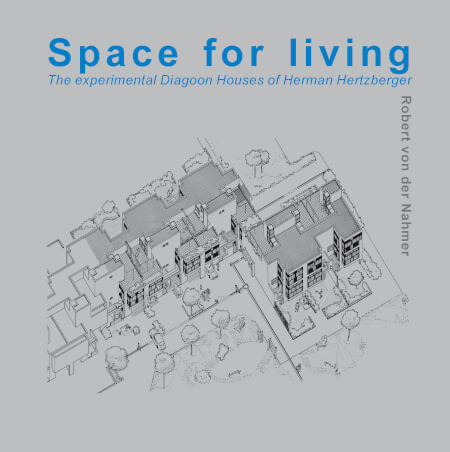
Space for Living
In 2021, Diagoon houses celebrated their 50th anniversary. To mark the occasion, the publication Space for living - The experimental Diagoon Houses of Herman Hertzberger appeared, describing the characteristics and related qualities of these experimental homes that guarantee a form of ‘ideal living’. It deals with the social context in which this experiment came about, the architectural and urban planning aspects, the underlying vision of the architect and the experiences of residents over the past fifty years. The publication is in line with the growing interest, reassessment and current research into architecture and urban planning after the reconstruction period, under the title Post65 (1965-1995). The publication is available in Dutch and English versions.
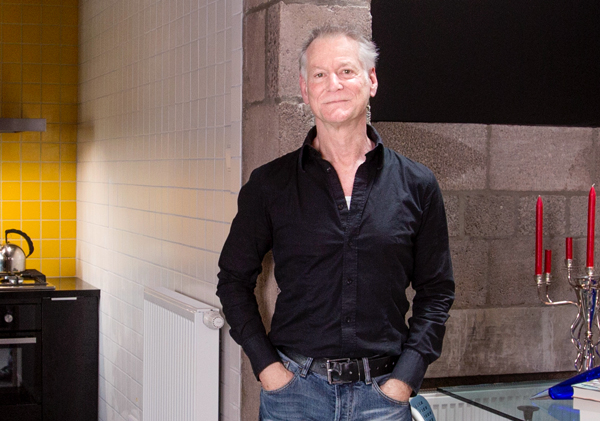
About the author
Robert von der Nahmer is an architect and owner of a Diagoon House in Delft. He graduated from the Royal Academy of Art in The Hague and the Academy of Architecture and Urban Planning in Rotterdam. He was an architect at Alkemade & Von der Nahmer and the multidisciplinary design firm ProForma. Until 2021, he was coordinator of professional practice and pre-masters at the Rotterdam Academy of Architecture, where he also taught. The house at 32 Gebbenlaan can be visited by appointment, see www.diagoonwoningdelft.nl
Movie Night 26 January 2023
Iconic Houses made a film about the developments of Dutch residential architecture in the twentieth century. In "Pioneers of the Modern Dwelling House in the Netherlands," the author of this article presents the theme "Experiments with Space. Join us 26 January in Amsterdams when the film is screened at Amsterdam School Museum Het Schip. Twenty iconic houses, spread throughout the Netherlands, provide insight into improved hygiene and health, palaces for the people, the roles of women as clients or architects, experimments woth space and the house as the architect's self-portrait.
Tickets are available at www.hetschip.nl/iconic-houses-filmavond
This article previously appeared in Dutch Magazine Herenhuis #92, November/December 2022.
Translated with www.DeepL.com.
Posted December 1, 2022
